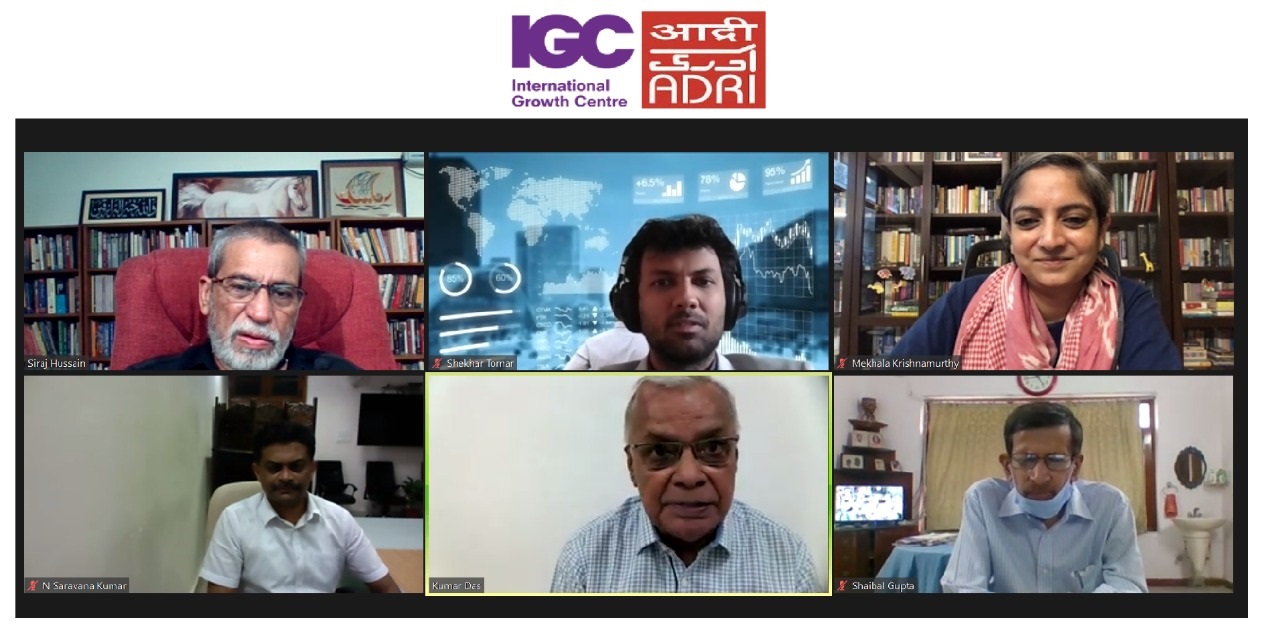Events of IGC

Title: Navigating the Impact of COVID-19 on Agriculture Supply Chain in India
Panellists: Mekhala Krishnamurthy (Ashoka University), N. Saravana Kumar (Department of Agriculture, Government of Bihar), Shekhar Tomar (Indian School of Business) and Siraj Hussain (ICRIER)
Date and Time: 19th October 2020, 15.00 - 16.30 (IST)
Zoom Link for Registration: Registration Link
Brief: The restoration of supply chains to their pre-lockdown levels will require prompt policy interventions and effective co-ordination among Central and State governments. In times like the current pandemic and with the recent announcements on agriculture reforms related to farm bills 2020, it becomes all the more important to create a space for having the necessary dialogues around the issue of agriculture supply chain in India. To walk the talk on this issue, International Growth Centre (IGC) of London School of Economics (LSE) and Asian Development Research Institute (ADRI) is organising a webinar on ‘Navigating the Impact of COVID 19 on Agriculture Supply Chain in India’ on 19th October 2020 at 3 PM.
Patna, October 19. A webinar titled Navigating the Impact of COVID-19 on the Agriculture Supply Chain in India was organized by Asian Development Research Institute and International Growth Center today. The event was started by Dr Shaibal Gupta (Member Secretary - ADRI) welcoming the panellist for the day. The panellists featured in the discussion were Shree N. Saravana Kumar, Secretary, Department of Agriculture, Bihar, Siraj Hussain, Senior Visiting Fellow - Indian Council for Research on International Economic Relations and former Secretary, Ministry of Agriculture, Government of India, Shekhar Tomar, Assistant Professor , Indian School of Business. The Panel was moderated by Mekhala Krishnamurthy, Associate Professor, Ashoka University.
Shaibal Gupta of ADRI stated that “The ongoing COVID-19 as a health catastrophe has affected all ways of life. In this pandemic, protecting people’s lives as well as the frontline facilities is now the current priority for both the State Governments and the Central Government. Both the Governments have rolled-up their sleeves for getting into actions to tackle this health disaster which also led to impose a nation-wide lockdown from March 24th – May 31st, 2020 that created massive disruptions across agri-food supply chains. The unplanned and sudden policy shocks affected all segments of food supply chains - from production, to procurement and processing, transport and logistics and final demand. Although, in principle, the nation-wide lockdown allowed free movement of “essential” commodities and allowed food markets to function without impediments, in reality, people who are involved in agriculture supply chain faced enormous challenges, including closure of wholesale markets for agricultural produce and restrictions and disruption on movement of vehicles, both across state borders and within cities. The early evidence at farm gate level suggested that the quantity arrivals in Mandis fell by 42% post the lockdown for commodities which are produced farther.
N. Saravana Kumar stated that “Bihar is major maize producing State, unfortunately maize price has crashed down by 50% during covid. Starch industry also got affected due to which demand for maize also dipped. The small-marginal farmers needed immediate cash and hence distress sale was observed due to covid, there was no procurement mechanism for maize. Floral agriculture also got affected since market demand went down such as temples were closed; this impacted marigold produce which are mostly cultivated by tenant farmers. We, State Government of Bihar, have given priority to subsidy and priority to those farmers whose market got affected due to covid time”. Apart from that he also emphasised over dairy farming. During the lockdown milk procurement increased by more than 20% from the rural areas. The covid crisis has shown that Information Technology plays a big role in terms of market price discovery, eNAM and market support for farmers. Going forward we aim to bring farmers together through FPOs or FPCs, we created Bihar Small-farmers Agri Consortium to handhold small-holder farmers in supporting backward and forward linkages.
Siraj Hussain said that irrespective of the delayed harvest this year in March due to the long winter, the procurement machinery of Punjab, Haryana and Madhya Pradesh did extremely well this year. A very commendable work that these states did also reflected in higher procurement this year than last year. He also emphasised that data on Agri-market portal needs to be carefully studied and analyzed on the quality of data.
Shekhar Tomar stated that farm products which are far away from the market we see there is a fall by 40% in mandis. Perishable products such as fruits and vegetables do not recover as seen due to disconnect of transportation of perishables from farm to plate. Local food supply chain becomes more important in dealing with such uncertain times.
Mekhala Krishnamurthy said that it is very enriching discussions to understand from the market point of view, price discussion and also from centre and state effectiveness point of view. To conclude it's up to the States to now invest, innovate and build institutions and build their visions for the agricultural sector.
Closing remarks were given by Dr. Prabhat Ghosh - Director ADRI. He emphasized on in times like the current pandemic and with the recent announcements on agriculture reforms related to farm bills 2020, it becomes all the more important to create a space for having the necessary dialogues around the issue of agriculture supply chain in India.